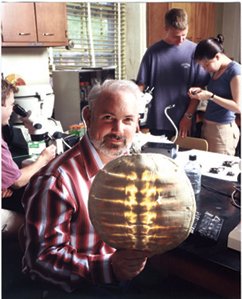Biologist Scott Gilbert on Pollution's Effect on Pregnancy

San Francisco Chronicle: To stop abortions, protect the EPA, don’t attack Planned Parenthood
What would it mean for us to commit ourselves as a society to caring for the development of human life? What would be the best way to stop abortions and protect human life? As an embryologist, I’m glad to say that the interventions needed are low tech and readily available: Curb pollution and protect social safety net policies.
Unlike the brains of many other animals, human brains keep growing for about two to three years after birth as if they were still inside the mother. During early childhood, we generate millions of new nerve cells each hour, and forge more than a million connections between nerves per square inch of brain cortex. This early stage of childhood — when the brain is growing in a social environment — is the time when education, healthy surroundings and good parenting make the difference between fully developed brains and stunted brains.
It is during this time — during pregnancy and the first three years after birth — that interventions can raise intelligence and healthy behaviors for the rest of one’s life. This is why I believe that what matters the most in protecting what is “human” is how we nurture, protect and care for developing human embryos and human beings.
Specifically, an intervention that would be incredibly effective would be to stop polluting the environment. New research suggests that the greatest cause of aborted pregnancies, most of which are involuntary, is pollution. That’s right: Numerous studies, many published in government journals and readily available, have shown that pollution causes abortions, miscarriages, and birth defects.
Howard A. Schneiderman Professor Emeritus of Biology Scott Gilbert is the author of Developmental Biology: Bioethics and the New Embryology, a volume that counts Emily Zackin '02 and Anna Tyler '03 as its co-authors, which discusses new findings in developmental biology with respect to philosophy and religion; and Ecological Developmental Biology, a textbook co-authored with David Epel which integrates developmental plasticity, epigenetics, and symbiosis into discussions of medicine and evolution. Gilbert is the recipient of several awards, including the Medal of François I from the Collège de France, the Dwight J. Ingle Memorial Writing Award, the Choice Outstanding Academic Book Award, honorary doctorates from the University of Helsinki and the University of Tartu, and a John Simon Guggenheim Foundation Grant. In 2002, the Society for Developmental Biology awarded him its first Viktor Hamburger Prize for Excellence in Education, and in 2004, he was awarded the Kowalevsky Prize in Evolutionary Developmental Biology. He is also a Finland Distinguished Professor at the University of Helsinki.


